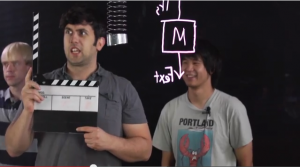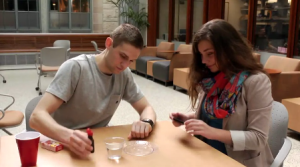At our January World Wine Web event, we had the pleasure to welcome Todd Murphey, Associate Professor in Mechanical Engineering at McCormick. Todd taught one of the first NU MOOCs this past fall on the Coursera platform: “Everything is the Same: Modeling Engineered Systems.” For those of you who weren’t able to hear Todd talk about his new teaching experience, you can still benefit from Todd’s insights because he was kind enough to answer some follow-up questions.
1) What motivated you to develop and teach “Everything is the Same: Modeling Engineered Systems,” one of NU’s first Coursera courses?
One of the things I noticed early in the MOOC debate was that people teaching MOOCs were almost unconditionally in favor of them. My concern was that there would be a fundamental bias as a result—that the only people who had any personal knowledge about teaching and learning using MOOCs would be people who bought into them ahead of time. So I decided I would like to create a great MOOC while fundamentally being objective about the impact on our students and the online students. I also thought it was exciting to take material we have had in our undergraduate curriculum and translate it into a medium many of our undergraduates find much more intuitive than traditional books.
2) What appealed to you about the open and free format?
Open and free means a lot of different things to different people. Yes, it means that anyone can take the class, but it also means that instructors are free to experiment. And it isn’t really free for the online students—they pay with their time and effort. In my mind, MOOCs provide an opportunity for us to try out new pedagogical ideas and have online students give us feedback.
3) What do you know about the students who took the Coursera class? What surprised you?
I gave a talk at the National Academy of Engineering’s “Frontiers of Engineering Education Workshop” on MOOCs in November. My MOOC had not yet finished, so I asked the online students to tell me what they would say to the academy about MOOCs given the chance. They had great, informative responses. Some of them are taking MOOCs because they lost jobs and want to have something to say during interviews about what they have been doing with their time. Some of them are considering going back to school. Some students are in high school, getting a taste of what college might be like. The range of reasons for taking a MOOC was quite a bit more broad than I anticipated.
4) Of the 18,000 people who signed up for the course, 1000 were still active in week 8, which reflects an attrition rate typical of many MOOCs. But in a recent talk you urged to look more carefully at how people use Coursera courses. You suggest that just because people are not submitting assignments in later weeks does not mean that they haven’t made good use of the learning material. Can you expand on this?
One of the main comments that came up in the discussion forum about MOOCs was that the students were annoyed that the media continues to focus on retention. Some people commented that they have jobs, they have children, and sometimes life interferes with getting a homework set done. They can do the homework at any time, so long as they do not want to get credit for it. Actually, students are still submitting homework now, ten weeks after the course ended.
5) You used the Coursera course to flip an engineering class here at Northwestern, i.e. NU students watched the Coursera videos before they came to class. Tell us a little bit about the reactions of your Northwestern students to this approach, the learning outcomes, and how the students evaluated their hybrid online/on-campus learning experience at the end of the course.
I did use the Coursera class to flip my residential class. Students watched lectures and did the online homework sets. The lectures were short—typically only 6 or 7 minutes long—so the out-of-class preparation was not too extensive. But initially students were very wary of using online content. They perceived, perhaps correctly, that there was a risk that faculty might use online content to avoid responsibility for student learning. Convincing them that the online content is just another type of asset, like a book or a website, was my first task. My next task was to figure out what I should do with the in-class time. Sometimes we talked about questions students had, sometimes we even talked about questions they had from other classes! Sometimes I had them do experiments, and sometimes I would essentially repeat a lecture to reinforce the concepts in the online lecture. But I still had the same amount of contact with them—possibly more.
Interestingly, I used less technology in the classroom with the MOOC. I used to use slides, but with the MOOC material, the conceptual scaffolding slides provide was unnecessary, so the class became much more fluid and flexible than it had been previously. The other great outcome was that online students did experiments at home, and I asked them to generalize the experiment and share it for peer assessment online. Not many people participated, but those that did participate really did a terrific job. I would show our residential students what the online students were doing for free, for fun. Naturally, that is inspiring to see. I’m going to use some of the ideas from students in the online class when I teach my residential class in the autumn. In a way, it is like crowdsourcing pedagogy.
6) What are your own thoughts after this experience in regard to how online and on-campus learning might interface in the future? Do MOOCs impact higher education and if so, how?
The most important thing to realize is that we at Northwestern have only done three classes so far, so we don’t have a lot to base a conclusion on, at least not yet. I made some decisions, ran a class, and now I have some opinions based on my experience. Really, we just need more people to experiment—and we will learn more from people doing something new, something different from what I did. I think that creating a class for such a large group certainly encourages careful thinking about class design; I have never thought so carefully about it before, and our students got value out of that care. But I also suspect that the MOOCs and other online experiments will have a more profound impact than just that, but we won’t know what the impact is for a while yet.




